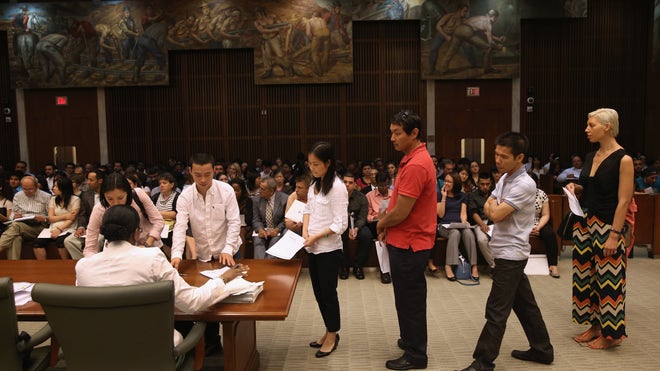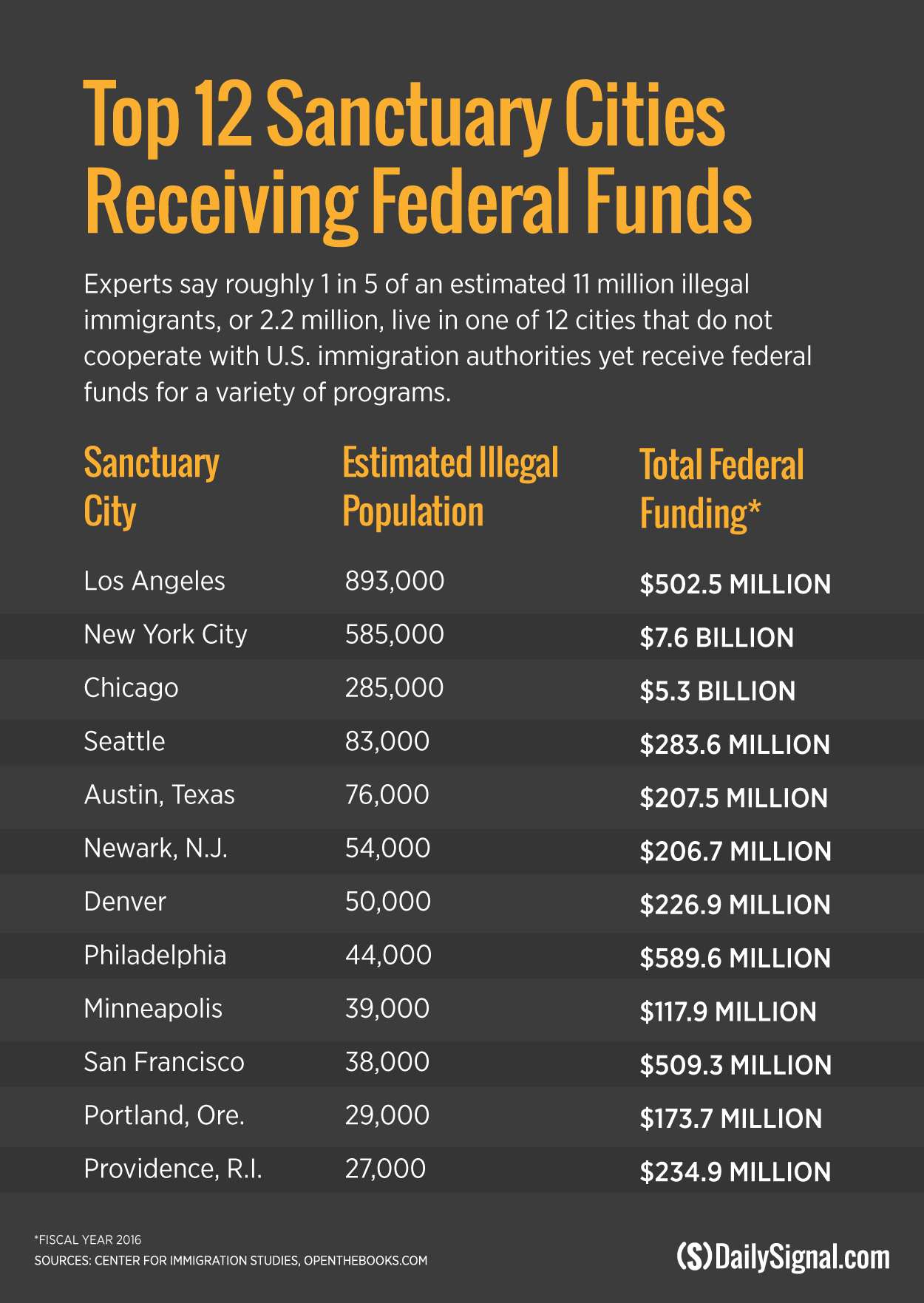The proposed Department of Justice budget request for 2018 for the Executive Office of Immigration is $421.5 million and includes 2600 employees with 831 lawyers. Judges assigned to immigration courts are being hired, shuffled around the country and have in some areas have a five year base backlog.
 FoxLatino
FoxLatino
The Executive Office for Immigration Review (EOIR) was created on January 9, 1983, through an internal Department of Justice (DOJ) reorganization which combined the Board of Immigration Appeals (BIA or Board) with the Immigration Judge function previously performed by the former Immigration and Naturalization Service (INS) (now part of the Department of Homeland Security). Besides establishing EOIR as a separate agency within DOJ, this reorganization made the Immigration Courts independent of INS, the agency charged with enforcement of Federal immigration laws. The Office of the Chief Administrative Hearing Officer (OCAHO) was added in 1987. In 2013, EOIR observed its 30th anniversary.
EOIR is also separate from the Office of Special Counsel for Immigration-Related Unfair Employment Practices in the DOJ Civil Rights Division and the Office of Immigration Litigation in the DOJ Civil Division.
As an office within the Department of Justice, EOIR is headed by a Director who reports directly to the Deputy Attorney General. Its headquarters are located in Falls Church, Virginia, about 10 miles from downtown Washington, DC.
New York City Law Creates Loophole To Avoid Deporting Criminal Illegal Immigrants
A New York City law that reclassifies several low-level offenses as non-criminal went into effect Tuesday, allowing citizen offenders to keep clean records and illegal immigrant offenders to potentially avoid deportation.
The law, passed by the city council and signed by Mayor Bill de Blasio in 2016, allows police to classify trial summonses for petty crimes as civil summonses, rather than criminal summonses. The change would affect crimes including public urination and drinking and staying in the park after dark, DNA Info reports. The change critically affects the impact of an executive order from President Donald Trump this spring ordering the deportation of illegal immigrants convicted of crimes.
Under the new law, illegal immigrants convicted of these crimes would receive a civil rather than criminal summons, which frees local law enforcement from the obligation of reporting the offender’s immigration status to Immigration and Customs Enforcement (ICE).
The law would affect cases such as Alejandro Luna, a former gang member and an illegal immigrant caught in central park after dark June 5 who now faces deportation. This would be Luna’s second deportation, the first came in 2006 after he was convicted of home-invasion and robbery. He then illegally entered the country again only to be detained on the June 5 park offense. More here.
***
Illegals presently have access to government funded healthcare. However:
The ‘Verify First Act’ by Rep. Lou Barletta (R-PA) would subsequently end American taxpayer-funded money going to illegal aliens in the form of healthcare insurance credits. The plan is being supported by NumbersUSA, a group which has staunchly advocated for Trump’s America First agenda.
“We applaud Rep. Lou Barletta for introducing the Verify First Act to ensure that illegal aliens cannot qualify for taxpayer-funded health insurance credits,” NumbersUSA Peter Robbio said in a statement. “We are grateful that the Ways and Means Committee and House Republican Leadership agreed to move this important bill forward.”
Since Obamacare’s enactment, illegal immigrants received more than $700 million in healthcare insurance credits by 2015, according to the Senate Committee on Homeland Security and Governmental Affairs.
In Barletta’s plan, healthcare insurance recipients through the American Health Care Act (AHCA) would have their citizenship and immigration statuses verified by the Social Security Administration (SSA) and the Department of Homeland Security (DHS). More here.
***
In part: Traditional sanctuary policies are often described as falling under one of three categories. First, so-called “don’t enforce” policies generally bar the state or local police from assisting federal immigration authorities. Second, “don’t ask” policies generally bar certain state or local officials from inquiring into a person’s immigration status. Third, “don’t tell” policies typically restrict information sharing between state or local law enforcement and federal immigration authorities. This report provides examples of various state and local laws and policies that fall into one of these sanctuary categories. The report also discusses federal measures designed to counteract sanctuary policies. For instance, Section 434 of the Personal Responsibility and Work Opportunity Reconciliation Act (PRWORA) and Section 642 of the Illegal Immigration Reform and Immigrant Responsibility Act (IIRIRA) were enacted to curb state and local restrictions on information sharing with federal immigration authorities.
State or local measures limiting police participation in immigration enforcement are not a recent phenomenon. Indeed, many of the recent “sanctuary”-type initiatives can be traced back to
activities carried out by churches that provided refuge—or “sanctuary”—to unauthorized Central American aliens fleeing civil unrest in the 1980s.13 A number of states and municipalities issued declarations in support of these churches’ actions.14 Others went further and enacted more substantive measures intended to limit police involvement in federal immigration enforcement activities.15 These measures have included, among other things, restricting state and local police from arresting persons for immigration violations, limiting the sharing of immigration-related information with federal authorities, and barring police from questioning a person about his or her immigration status.16
Still, there is no official definition of a “sanctuary” jurisdiction in federal statute or regulation.17 Broadly speaking, sanctuary jurisdictions are commonly understood to be those that have laws or policies designed to substantially limit involvement in federal immigration enforcement activities,18 though there is not necessarily a consensus as to the meaning of this term.19 Some jurisdictions have self-identified as sanctuary cities.
The federal government’s power to regulate immigration is both substantial and exclusive.23 This authority is derived from multiple sources, including Congress’s Article I powers to “establish a uniform Rule of Naturalization” and “regulate commerce with foreign nations, and among the several states,”24 as well as the federal government’s “inherent power as a sovereign to conduct relations with foreign nations.”
The Supreme Court’s 2012 ruling in Arizona v. United States—which invalidated several Arizona laws designed “to discourage and deter the unlawful entry and presence of aliens and economic activity by persons unlawfully present in the United States”28 as preempted by federal law—reinforced the federal government’s pervasive role in creating and enforcing the nation’s immigration laws.29 “The Government of the United States,” the Court said, “has broad, undoubted power over the subject of immigration and the status of aliens.”30
Yet despite the federal government’s sweeping authority over immigration, the Supreme Court has cautioned that not “every state enactment which in any way deals with aliens is a regulation of immigration and thus per se preempted” by the federal government’s exclusive power over immigration.39 Accordingly, in Arizona the Supreme Court reiterated that, “[i]n preemption analysis, courts should assume that the historic police powers of the States are not superseded unless that was the clear and manifest purpose of Congress.”40 For example, in Chamber of Commerce of the U.S. v. Whiting, the Supreme Court upheld an Arizona law—related to the states’ “broad authority under their police powers to regulate the employment relationship to protect workers within the State”41—that authorized the revocation of licenses held by state employers that knowingly or intentionally employ unauthorized aliens.42 Even though the Immigration Reform and Control Act of 1986 (IRCA) expressly preempted “any State or local law imposing civil or criminal sanctions … upon those who employ, or recruit or refer for a fee for employment, unauthorized aliens,” the Supreme Court concluded that Arizona’s law fit within IRCA’s savings clause for state licensing regimes and thus was not preempted.43
Accordingly, based on current jurisprudence, federal measures that impose direct requirements on state or municipal authorities appear most likely to withstand an anti-commandeering challenge if they (1) are not directed at a state’s regulation of the activities of private parties; and (2) apply to the activities of private parties as well as government actors.
Finally, Congress does not violate the Tenth Amendment when it uses its broad authority to enact legislation for the “general welfare” through its spending power,62 including by placing
conditions on funds distributed to the states that require those accepting the funds to take certain actions that Congress otherwise could not directly compel the states to perform.63 However, Congress cannot impose a financial condition that is “so coercive as to pass the point at which ‘pressure turns into compulsion.’”64 For example, in National Federation of Independent Business v. Sebelius, the Supreme Court struck down a provision of the Patient Protection and Affordable Care Act of 2010 (ACA) that purported to withhold Medicaid funding to states that did not expand their Medicaid programs.65 The Court found that the financial conditions placed on the states in the ACA (withholding all federal Medicaid funding, which, according to the Court, typically totals about 20% of a state’s entire budget) were akin to “a gun to the head” and thus unlawfully coercive.66
violations of federal immigration law may be criminal or civil in nature, with alien removal understood to be a civil proceeding.71 Some immigration-related conduct potentially constitutes a removable offense and also may be subject to criminal sanction. For example, an alien who knowingly enters the United States without authorization is not only potentially subject to removal,72 but could also be charged with the criminal offense of unlawful entry.73 Other violations of the INA are exclusively criminal or civil in nature. Notably, an alien’s unauthorized immigration status makes him or her removable, but absent additional factors (e.g., having reentered the United States after being formally removed),74 unlawful presence on its own is not a criminal offense.
Some jurisdictions have adopted measures that restrict or bar police officers from making arrests for violations of federal immigration law. In some jurisdictions restrictions prohibit police from detaining or arresting aliens for civil violations of federal immigration law, like unlawful presence.75 Other jurisdictions prohibit police from making arrests for some criminal violations of federal immigration law, like unlawful entry.76 Still others prohibit assisting federal immigration authorities with investigating or arresting persons for civil or criminal violations of U.S. immigration laws.77 And some other jurisdictions have prohibitions that are broader in scope, such as a general statement that immigration enforcement is the province of federal immigration authorities, rather than that of local law enforcement.
Some states and localities have restricted government agencies or employees from sharing information with federal immigration authorities, primarily to prevent federal authorities from using the information to identify and apprehend unlawfully present aliens for removal.88 For instance, some jurisdictions prohibit law enforcement from notifying federal immigration authorities about the release status of incarcerated aliens, unless the alien has been convicted of certain felonies.89 Similarly, other jurisdictions prohibit their employees from disclosing information about an individual’s immigration status unless the alien is suspected of engaging in illegal activity that is separate from unlawful immigration status.90 Some jurisdictions restrict disclosing information except as required by federal law91—sometimes referred to as a “savings clause”—although it appears that the Department of Justice has interpreted those provisions as conflicting with federal information-sharing provisions. For the full summary and context with access to footnotes, go here.

.jpg)
